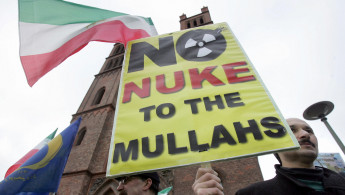Trump wants Israel, Arabs to buddy up against Iran
The new Trump administration is looking to create a new 'NATO' agreement between four Arab nations, where intelligence would be shared openly with Israel.
The new agreement has been proposed to Saudi Arabia, the United Arab Emirates (UAE), Egypt and Jordan and is seen as a formal military alliance against a growing geopolitical threat from Iran.
"Israel's role would likely be intelligence sharing, not training or boots on the ground," one anonymous Arab official told the Wall Street Journal.
"They'd provide intelligence and targets. That's what the Israelis are good at."
The news may be seen as controversial by many in the Arab world, as Saudi Arabia and the UAE currently do not formally share diplomatic relations with Israel.
 |
When asked about the possibility of a new NATO-style coalition, Israeli prime minister, Benjamin Netanyahu, said he believed it was a "great opportunity for peace". |  |
Bilateral relations have begun to thaw in recent months however, after a retired Saudi general visited Israel in June to discuss a Saudi-led Arab Peace Initiative.
The unofficial Saudi delegation, led by Dr. Anwar Eshki, met with the Israeli Director-General of the Foreign Ministry, Dore Gold, before later meeting Palestinian President Abbas in Ramallah.
In order to sweeten the intelligence-sharing deal, Washington has been entertaining various key and long-standing demands from the individual states.
Key among these demands is the possibility the US may designate the Muslim Brotherhood a terrorist organisation in a capitulating move towards Cairo.
Egypt has been seen to move towards Iran recently, as its relations with Saudi Arabia have become frayed over a number of regional and economic issues.
| Read more: Leak reveals Egypt 'requested Israeli permission' for islands deal |
In addition to its stance against Iran, Israel also shares a common enmity with the four Arab states against the Muslim Brotherhood and Hamas.
Saudi Arabia has reportedly repeated its request that the US cancel its legislation, allowing the victims of the September 11 bombing to sue the Saudi government.
The new military coalition would receive US support and consultancy in a similar manner to its current involvement in the Yemen conflict.
Previous attempts at a pan-Arab military force have not met much success. The Arab League agreed in principle to the idea in 2015, but inherent distrust among individual states over commitments has meant that no further action was taken.
When asked about the possibility of a new NATO-style coalition, Israeli prime minister, Binyamin Netanyahu, said he believed it was a "great opportunity for peace".
President Trump said: "It is something that is very different, hasn't been discussed before.
"It's actually a much bigger deal—much more important deal in a sense. It would take in many, many countries and would cover a very large territory."
The idea of a military alliance against Iran was first floated by the ex-security advisor, Michael Flynn at a testimony hearing in Congress in June 2015.






